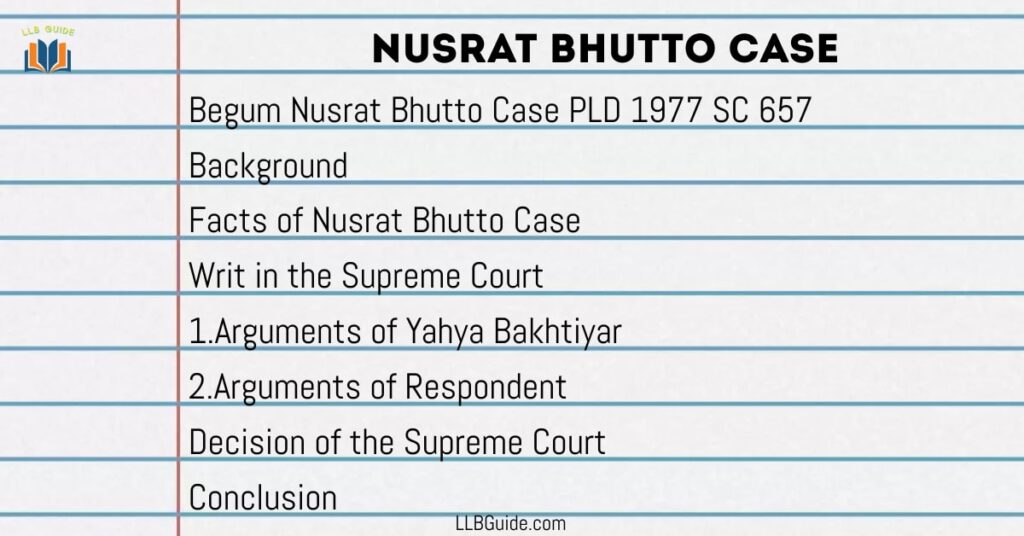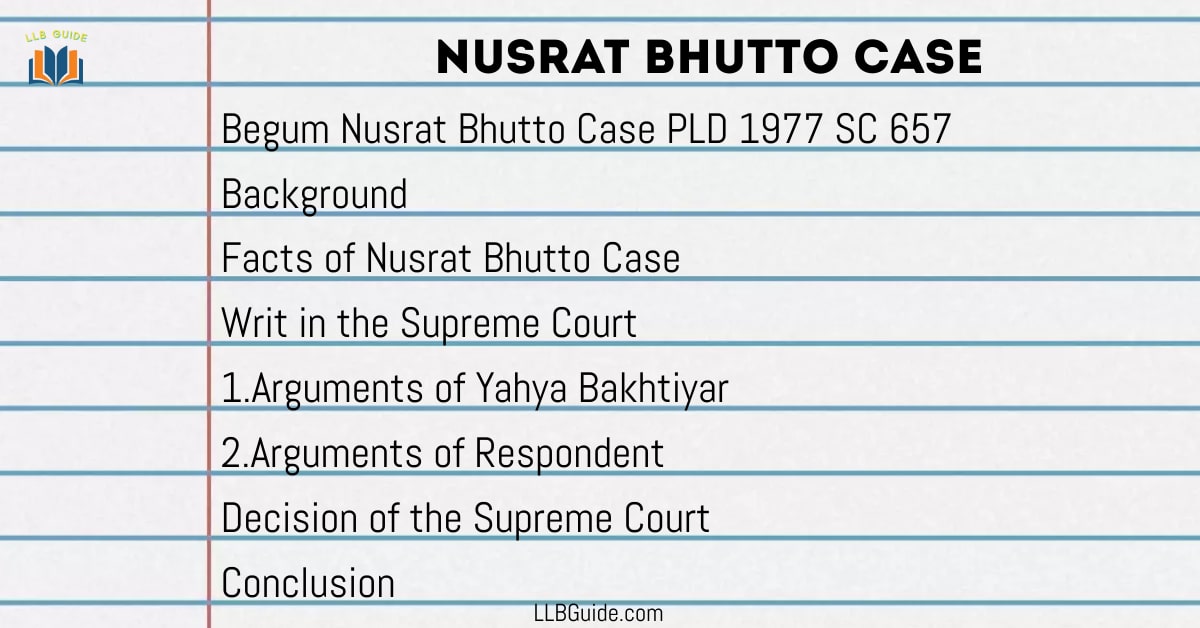Begum Nusrat Bhutto Case, (Vs Chief of Army Staff) was the second case in which the Supreme Court validated Martial law imposed in the country by the Army officials, based on the “Doctrine of Necessity”.

Table of Contents
Begum Nusrat Bhutto Case PLD 1977 SC 657
The leading constitutional case, the Nusrat Bhutto case pld 1977 sc 657 is explained in simple words.
Background
On the 7th of March 1977, there were general elections in the country, and two major parties participated in this election, namely Pakistan Peoples Party and PNA (Pakistan National Alliance). PNA consisted of 9 political parties.
The Pakistan Peoples Party got 155 seats in this election, on the other side the PNA only got 36 seats. Mr Zulfiqar Ali Bhutto retained his office as the Prime Minister of Pakistan.
The opposition rejected the election result and made allegations of buncos and interference in the election by Mr. Zulfiqar Ali Bhutto and started the anti-Bhutto Movement against him. As a result of the anti-Bhutto Movement, there have been protests, chaos, and stampeding in the country.
On the 5th of July 1977, the Chief of Army Staff General Zia Ul Haq promulgated Martial law in the country. He temporarily suspended the Constitution of Pakistan 1973 and dissolved the Federal and Provincial Assemblies. He also appointed the High Court’s Chief Justices as the acting Governors.
Afterward, on the 17th of September 1977, General Zia Ul Haq detained Mr Zulfiqar Ali Bhutto and ten other leaders of the Pakistan Peoples Party under Martial Law Order number 12.
Facts of Nusrat Bhutto Case
The facts of Begum Nusrat Bhutto case are briefly described below.
Writ in the Supreme Court
Begum Nusrat Bhutto who was the wife of Mr Zulfiqar Ali Bhutto, filed a writ petition in the Supreme Court of Pakistan under Article 184 (3) of the Constitution of 1973, against the detention of her Husband.
Advocate Mr Yahya Bakhtiyar represented Begum Nusrat Bhutto.
Arguments of Yahya Bakhtiyar
The main arguments of Advocate Mr Yahya Bakhtiyar were:
- He relied on the Asma Jilani Case (in which the Martial law imposed by General Yahya Khan was declared illegal).
- He said that in the Constitution of 1973, there was no such power for the Army Chief to impose Martial law in the country.
- So, the Martial law is illegal and General Zia Ul Haq should be convicted under Article 6 of the Constitution of 1973.
- He also said that the purpose of such detention is to prevent the Pakistan Peoples Party from the upcoming elections.
- He argued that even then we consider this Martial law justified, for the sake of argument, such detention of Mr Zulfiqar Ali Bhutto and ten other leaders of Pakistan Peoples Party is still illegal because this detention is based on discrimination and no leaders from any party have been detained.
Arguments of Respondent
Advocate Mr A.K Brohi represented General Zia Ul Haq, his arguments were:
- He relied on the Dosso Case (in which the Supreme Court validated Martial law, imposed by General Muhammad Ayub Khan, based on ‘The Doctrine of Necessity’).
- He said that there had been chaos and stampeding in the country and the Martial law was necessary to impose.
- Such Martial law was temporary, there were elections the next month and democracy would be restored in the country.
- And whereas the Constitution was suspended, the detentions made under this Martial law were also valid.
Decision of the Supreme Court
The Supreme Court decided unanimously in the Begum Nusrat Bhutto Case. It was held that:
- The act of General Zia Ul Haq imposing Martial law was not a Martial law but an extra-constitutional step that was necessary to take because there were so many protests in the country.
- The Supreme Court once again discussed the Doctrine of Necessity.
- The act of General Zia Ul Haq was temporary and valid.
- The writ petition filed by the Begum Nusrat Bhutto was not maintainable and was rejected because the Constitution itself was suspended (for the time being).
- The detention of Mr Zulfiqar Ali Bhutto was legal.
- Martial law imposed by General Zia Ul Haq was also legal.
The Supreme Court also elaborated that the facts of the Asma Jilani case were different, Martial law imposed by General Yahya Khan was unwarranted and unnecessary so was illegal, but here is a completely different scenario.
Conclusion
In the Nusrat Bhutto case, the Supreme Court rejected the writ petitions and declared the detention of Mr Zulfiqar Ali Bhutto legal.

